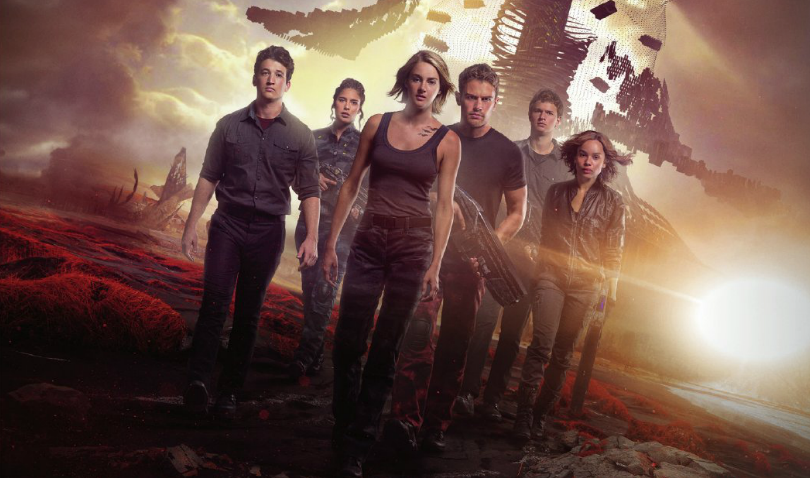Allegiant is the third installment in the Divergent movie series based on books by Veronica Roth set in a futuristic dystopian society based in Chicago.
The citizens of Chicago, as we join them, have separated into different factions: “Abnegation” (The Selfless), “Dauntless” (The Brave), “Candor” (The Honest), “Erudite” (The Intelligent), and “Amity” (The Peaceful). Generally, children are automatically raised in their parents’ factions. However, when they are of age they have the opportunity to choose to stay in the faction they were born in or join another faction.
Protagonist Tris Prior (portrayed by Shailene Woodley) is born into Abnegation but chooses to switch into Dauntless. During her time with the Dauntless faction, Tris learns that she does not belong in any of the five factions, making her “divergent.” Tris being divergent is seen as a danger to the government of Chicago because she can not be fit into a single faction. Thus, she is believed to be a risk to the faction system and to society.
During the second movie, Insurgent, Tris was constantly pursued by government authorities. In the end, the oppressive government was defeated, in part due to their leader, Jeanine Matthews’ (Kate Winslet) death, and a new government was formed, with Evelyn Eaton (Naomi Watts) as its leader.
Allegiant begins with an overview of changes brought in by the new government. However, we see that this new government is no better than the last one. Eaton is seen allowing mob rule, her citizens executing a man they deemed guilty without turning to laws or a proper trial. This violence sparks controversy within the community, which divides the citizens and gives way to war.
The Divergent movie series has many similarities to other dystopian film series such as The Hunger Games and The Maze Runner. Although these movies may differ in plot, the underlying themes remain the same. Governments constantly believe, and promote the belief, that their actions are justified, characterizing despicable acts as being for society’s good. In the Divergent series, the government believes that separating society into factions is what will keep the peace. Their fear is driven by ignorance and the idea that conformity will benefit society and maintain peace. These types of emotions can also be seen in The Hunger Games, particularly in the film series’ plot device of having the government send a child from each district into an arena, and forcing them to kill one another: a revamped Battle Royale, or Lord Of The Flies.
Allegiant follows a similar plot as most recent dystopian films: an oppressive, totalitarian government, a protagonist who ends up defying them, and a subsequent rebellion and war involving all citizens. Although Allegiant’s plot doesn’t stray far from the norm, the film does have great effects, good character development, and many climactic scenes.
Shailene Woodley portrays Tris’s growth and character development in a believable way throughout the series. One of the most drastic changes in her character’s arc comes in this film — Tris becomes a leader, as opposed to sticking to the sidelines and following others.
When Tris and her friends discover a city beyond the walls of Chicago, she is introduced to their leader, David (Jeff Daniels). David tells Tris that people within Chicago are “damaged” and that people within his city are “pure.” David wonders why Tris is also pure despite her growing up in Chicago, and asks Tris to help him find out why. She goes along with his wishes, although she realizes in the end that David had been selfishly manipulating her. She defies him and goes back to Chicago.
Tris’s growth and character development is one of the best aspects of the film. That, along with the many great effects and scenery, the strong performance of Theo James as Four, and the comic relief that Miles Teller provides while playing the conflicted character Peter Hayes made the film entertaining to watch.
However, movies based in a dystopian society are not just about visual effects or a love story between the protagonist and a boy she meets along the way. The underlying themes are meant to bring awareness to the audience about conformity and violence that can possibly happen and are still happening throughout the world.
Audiences may assume that movies such as Allegiant and The Hunger Games are merely entertainment. But these movies symbolize a world that can become reality if humanity loses its compassion and rationale. Many of these dystopian societies segregate and try to reshape certain individuals because they are different. To a dystopian society anything different is deemed to be a threat. This type of thinking is not uncommon in our world today. However, characters within dystopian films also teach the audience to accept the many differences that people have, that love and acceptance trumps fear and ignorance, and that with a bit more understanding and compassion towards others, these dystopian societies have a way to rebuild themselves into something better.


